Carnations (Dianthus) are beautiful flowers that symbolize fascination and motherly love. These herbaceous perennials come in various types and are known for their spicy, clove-like fragrance. Although growing carnations is pretty easy, a few well-chosen companion plants can really help. In this article, I’ll run through 24 of the best companion plants for carnations.

Table of Contents:
- What Are Companion Plants?
- Advice for Choosing Companion Plants for Carnations
- 24 Best Companion Plants For Carnations:
- Carnations Companion Plants FAQs:
What Are Companion Plants?
Companion plants provide several benefits to other plants in your garden. Some companion plants distract or deter pests, while others enrich or stabilize the soil.
Companion plants can also complement and emphasize the central plants in your garden displays. I also like to use companion plants like borage to attract pollinators and other beneficial insects into my garden.
Advice for Choosing Companion Plants for Carnations
When choosing companion plants for carnations, there are a few factors to consider. One of the main things I always think about is what conditions carnations like. Ideally, the companion plants we choose should also thrive in these conditions.
Most carnations thrive in USDA Hardiness Zones 7 to 10, although some species can survive in climates as cold as Zone 4. Carnations also need approximately four to six hours of full sun every day. These perennials grow best in fertile, well-draining loamy, chalky, or sandy soils.
It’s also important to choose companion plants that won’t overshadow your carnations. Most carnations grow approximately 0.5 to 2 feet tall and about 10 to 14 inches wide. If you want your carnations to be the stars of the show, choose smaller companion plants.
I usually use companion plants to keep pests away from my carnations. As such, I need to choose companion plants that attract the kinds of pests that usually attack my carnations. Common carnation pests include aphids and scale insects.
24 Best Companion Plants For Carnations:
1) Alyssum

Alyssum plants are herbaceous annuals or perennials from the Alyssum genus of the brassica family (Brassicaceae). These plants are native to parts of Africa, Asia, and Europe. Alyssum plants have oblong or oval-shaped leaves and clusters of small yellow, white, pink, or purple flowers.
Alyssum plants work well as companion plants because of their leaves. Many caterpillars feed on alyssum leaves, keeping them away from your carnations. Rabbits don’t like alyssum leaves, so use them as a barrier to protect your carnations.
2) Borage

Borage is a well-known companion plant from the Boraginaceae family native to the Mediterranean. These herbaceous annuals have blue star-shaped flowers and hairy stems. Borage flowers profusely during the summer and thrives in full sun in Zones 2 to 11.
I love using borage to attract legions of pollinators to my garden. The blue flowers are particularly popular with bees. Borage also attracts predatory insects that will eat pests that could harm your carnations. As such, borage is a fantastic companion plant for carnations.
3) Calendula

Also known as pot marigolds, Calendula plants are herbaceous annuals or perennials from the daisy family (Asteraceae). Calendula plants are common companion plants because they attract pollinators and help repel various pests.
Calendula officinalis is the most common species of pot marigold used as a companion plant. This species has hairy lance-shaped or oblong leaves and large orange or yellow daisy-like flowers with dark brown central florets. Pot marigolds thrive in Zones 2 to 11 and prefer full sun or partial shade.
4) Catnip
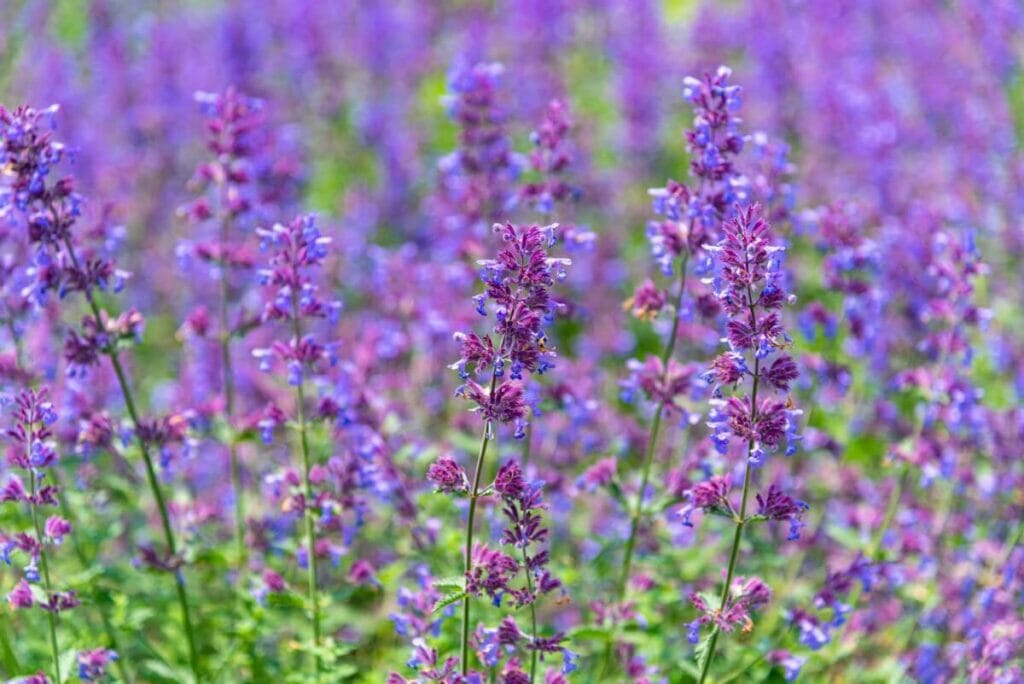
Catnip (Nepeta cataria) is a herbaceous perennial from the mint or sage family (Lamiaceae). Although known for its effects on cats, catnip is also an excellent companion plant. Catnip attracts pollinators while also repelling aphids, ants, and other pests due to its strong, minty scent.
These perennials grow best in Zones 3 to 9 and require full sun. Catnip has triangular leaves with toothed edges. From spring until fall, catnip produces clusters of small pink or white flowers with purple spots.
5) Chives

Chives (Allium schoenoprasum) are well-known herbs from the Amaryllis family (Amaryllidaceae). Native to Asia, Europe, and North America, chives have hollow stems and dense, purple flower heads. The long, soft stems are used in cooking.
Chives make great companion plants for carnations because they attract pollinators. Chives also have a strong fragrance that deters and repels pests like aphids, greenflies, and mosquitoes. These popular herbs are easy to grow in Zones 3 to 9 and thrive in full sun or partial shade.
6) Chrysanthemums

As well as having beautiful flowers, chrysanthemums are also excellent companion plants for carnations. Chrysanthemum and carnation flowers overlap in the fall, creating a beautiful display as both flowers complement each other. Chrysanthemums also help repel pests thanks to the pyrethrin compounds in their flowers.
Chrysanthemums come from the daisy family. These herbaceous perennials produce dense pink, purple, yellow, white, or red flower heads. Some have daisy-like flowers with central florets. Chrysanthemums also have delicate alternate leaves divided into feathery leaflets.
7) Columbines

Columbines are attractive herbaceous perennials from the Aquilegia genus of the buttercup family (Ranunculaceae). These colorful flowers thrive in shady habitats throughout the Northern Hemisphere. Columbines have trumpet-shaped flowers with distinctive hooked spurs protruding from the back.
Columbines are good companion plants because of their compact size and vibrant flowers. A few well-placed columbines can really enhance your carnation display. Due to their size, columbines won’t distract from your carnations. Columbines grow best in partial shade in Zones 3 to 8.
8) Coreopsis
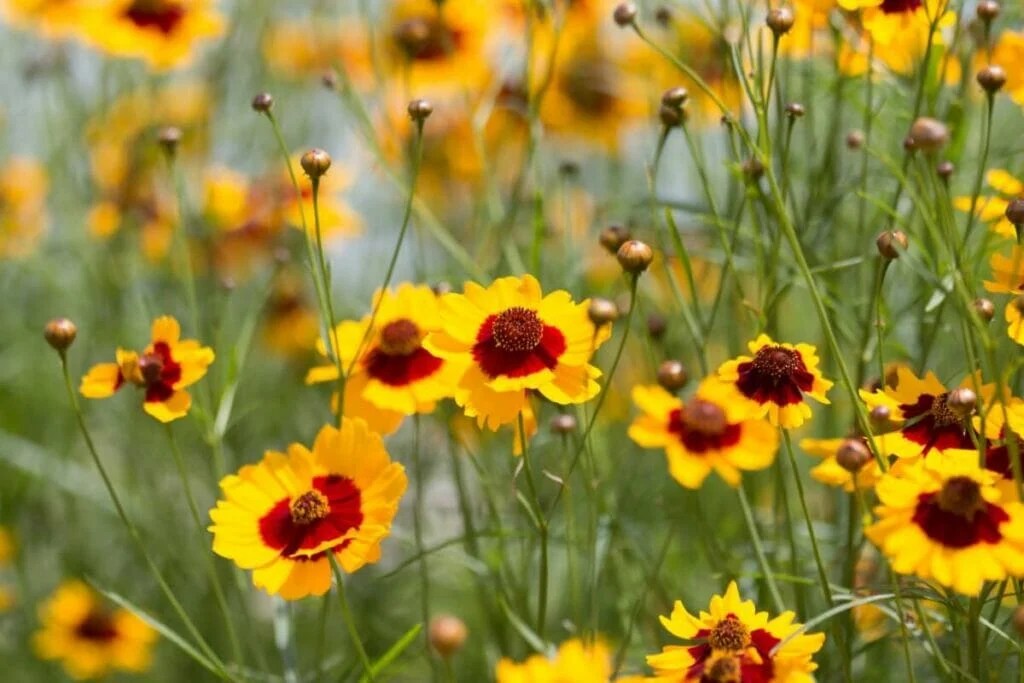
Commonly known as tickseed, coreopsis flowers are popular wildflowers from the daisy family. Coreopsis flowers are native to prairies across the Americas. These herbaceous annuals or perennials grow in clumps of orange, yellow, or red daisy-like flowers and lance-shaped leaves.
Coreopsis flowers are good companion plants for carnations because they attract pollinators. These wildflowers also attract predatory insects like hoverflies, which feed on common carnation pests like aphids. Coreopsis flowers are also easy to grow and thrive in full sun in Zones 3 to 8.
9) Cosmos
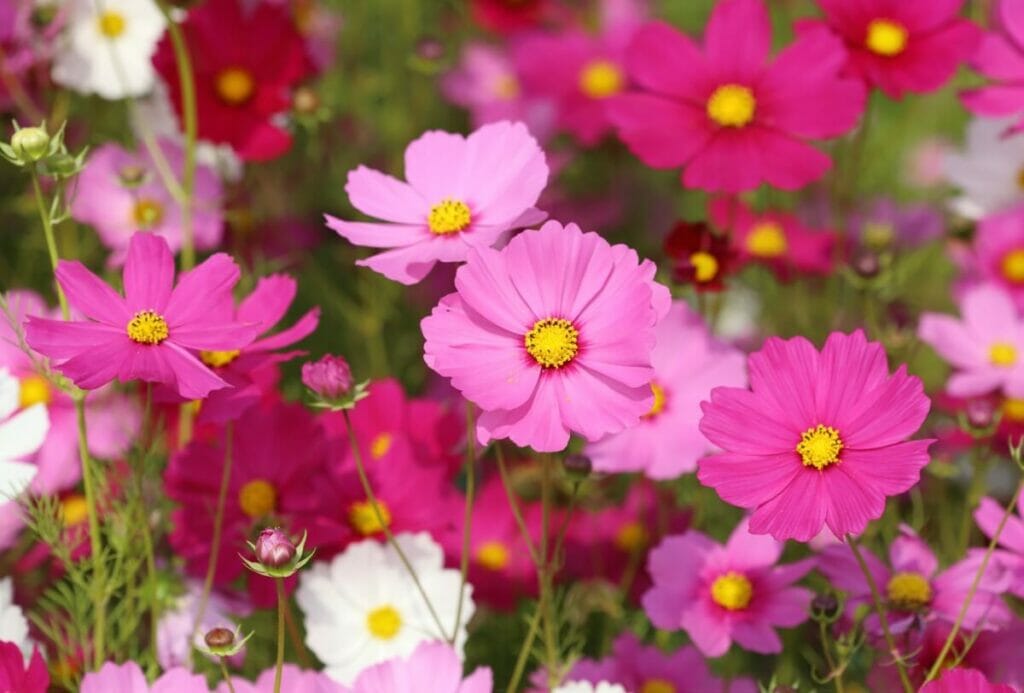
Cosmos flowers are gorgeous annuals from the daisy family. These popular flowers are great companion plants for carnations because they attract pollinators like bees and butterflies. Cosmos flowers also encourage hoverflies and lacewings to visit your garden and feed on aphids and other common carnation pests.
In addition, cosmos plants have large, colorful, daisy-like flowers with yellow central florets. They also have attractive feathery leaves. These gorgeous annuals are easy to grow in Zones 2 to 11 but need full sun.
10) Foxglove

Foxgloves are vibrant biennials known for their tall stalks of colorful bell-shaped flowers. Foxgloves come from the Digitalis genus of the plantain family (Plantaginaceae). These popular ornamental plants often have pink, purple, yellow, or white flowers.
Foxgloves are good companion plants for carnations because they attract pollinators, especially bees. Thanks to their tall, narrow form, foxgloves also complement carnations well as part of a summer display. Foxgloves grow best in full sun or partial shade in Zones 4 to 9.
11) Geraniums
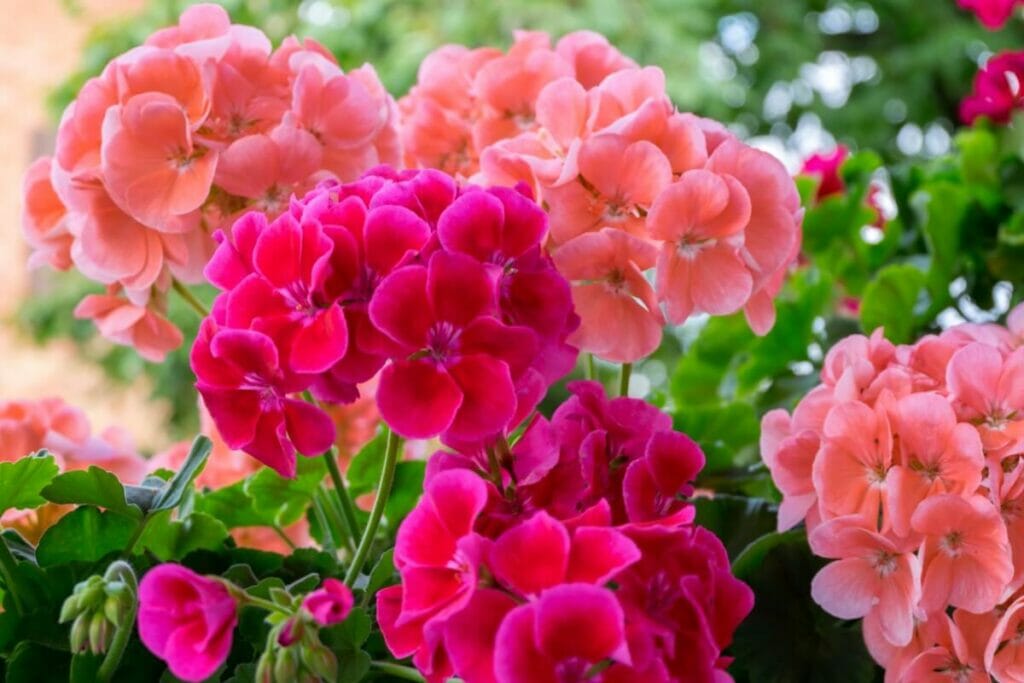
Geraniums, also known as pelargoniums, are beautiful companion plants that work well alongside carnations. These plants have attractive cup-shaped flowers with five petals and noticeable veins. These geraniums are frequently grown as annuals and are only hardy in Zones 9 to 12.
Geraniums and pelargoniums work well as companion plants because they deter pests like beetles and leafhoppers. These geraniums also repel spider mites due to their fragrances. The attractive flowers also perfectly complement carnation flowers to create a gorgeous display.
12) Larkspur

Also known as delphiniums, larkspur flowers are herbaceous annuals or perennials from the buttercup family. Larkspur plants have slender stems covered in blue, pink, purple, red, yellow, or white flowers. Larkspurs also have palmate leaves with three to seven lobes.
Larkspur flowers can grow up to 6 feet high, making them ideal for the back of a border display. As such, larkspur flowers can complement your carnations well. Plant larkspurs behind your carnations and use complementary colors for a beautiful summer display.
13) Lavender

Lavender bushes are fabulous, fragrant, herbaceous perennials from the mint family. These aromatic plants have a pungent fragrance that repels pests, making them ideal companion plants for carnations. Lavender bushes also attract pollinators such as bees and butterflies, helping to pollinate your carnations.
During the summer, lavender bushes produce thin upright stems topped with oblong clusters of tiny blue, purple, or white flowers. Lavender plants are native to the Mediterranean but thrive in full sun in Zones 5 to 9.
14) Marigolds

Not to be confused with pot marigolds, marigolds (Tagetes spp.) are herbaceous annuals or perennials native to Mexico. These marigolds come from the daisy family and have orange or yellow pom-pom-like flower heads. Marigolds also have attractive pinnate leaves.
What’s great is that marigolds work well as companion plants for many plants, including carnations. Another benefit of marigolds is that they attract pollinators and beneficial insects like hoverflies and lacewings. These insects then feed on common carnation pests such as aphids. Marigolds also repel rabbits that might otherwise munch on your carnations.
15) Nasturtiums

Nasturtiums are showy annuals or perennials from the Tropaeolaceae family. These vibrant flowers are native to parts of Central and South America. Nasturtiums have large orange, red, or yellow trumpet-shaped flowers and rounded leaves with white veins.
Interestingly, Nasturtiums make good companion plants because they keep beetles, whiteflies, and other pests away from your carnations. Nasturtiums attract pollinators and other beneficial insects thanks to their large flowers. I also like to grow nasturtiums because both the leaves and flowers are edible.
16) Oregano

Oregano is a woody perennial from the mint family. This popular kitchen herb is native to the Mediterranean. However, oregano is also a great companion plant for carnations because it attracts pollinators. Oregano also has a strong, pungent smell that deters and repels pests.
Oregano plants have tall, thin stems and spade-like leaves. During the summer, oregano is covered in tiny pink, purple, or white flowers borne on opposite branches. Oregano grows best in full sun and thrives in Zones 5 to 10.
17) Petunias

Petunias are colorful, attractive flowers from the nightshade family (Solanaceae). These tender perennials can also be grown as annuals and are often used as ornamental flowers. Petunias have vibrant trumpet-shaped pink, purple, red, white, and yellow flowers. They can be grown as perennials in Zones 9 to 11.
What’s more, petunias make good companion plants for carnations because they attract bees, butterflies, and other vital pollinators. Petunia flowers may also help deter notorious carnation pests such as aphids, beetles, and leafhoppers.
18) Salvia

Commonly known as sage, salvias are popular herbs that also work well as companion plants for carnations. Salvias belong to the mint or sage family and are found worldwide. Salvias have square stems and toothed leaves. During the summer, salvias produce dense racemes of distinctive claw-shaped flowers.
Salvias are good companion plants because they attract important pollinators like bees and butterflies. These versatile flowers can also repel annoying pests or attract predatory insects like hoverflies and lacewings.
19) Snapdragons

Snapdragons are beautiful herbaceous perennials from the Antirrhinum genus of the plantain family. These attractive plants produce dense spikes of colorful flowers that look like the snouts of dragons. Although technically perennials, snapdragons are short-lived, so they are usually grown as annuals.
Snapdragons work well in a display with carnations because their tall flower spikes complement carnation flowers perfectly. Snapdragons can also attract pollinators that will then pollinate your carnations. Like carnations, snapdragons grow best in full sun or partial shade.
20) Sunflowers

Although often grown as tall, cheery ornamentals, sunflowers are also excellent companion plants for carnations. Sunflowers come from the Helianthus genus in the daisy family. These annuals or perennials have large daisy-like flowers with dense central florets surrounded by ray petals. Sunflowers also have coarse, heart-shaped leaves and hairy stems.
What’s more, Sunflowers help divert ants and aphids away from carnations, as these pests can’t do much damage to strong, healthy sunflowers. Interestingly, they also draw in pollinators and beneficial insects like bees, butterflies, and hoverflies.
21) Sweet Alyssum

Sweet alyssum (Lobularia maritima) is a herbaceous annual from the brassica or cabbage family. This low-growing plant is also a good companion plant for carnations because it attracts pollinators and deters aphids. Due to its compact, mat-forming habit, sweet alyssum won’t impede your carnations while adding to the display.
Sweet alyssum produces dense clusters of tiny white or pink flowers. These attractive flowers give off a sweet, honey-like fragrance from spring until fall. Sweet alyssum also has clumps of large, hairy, lance-shaped, or oval-shaped leaves.
22) Thyme
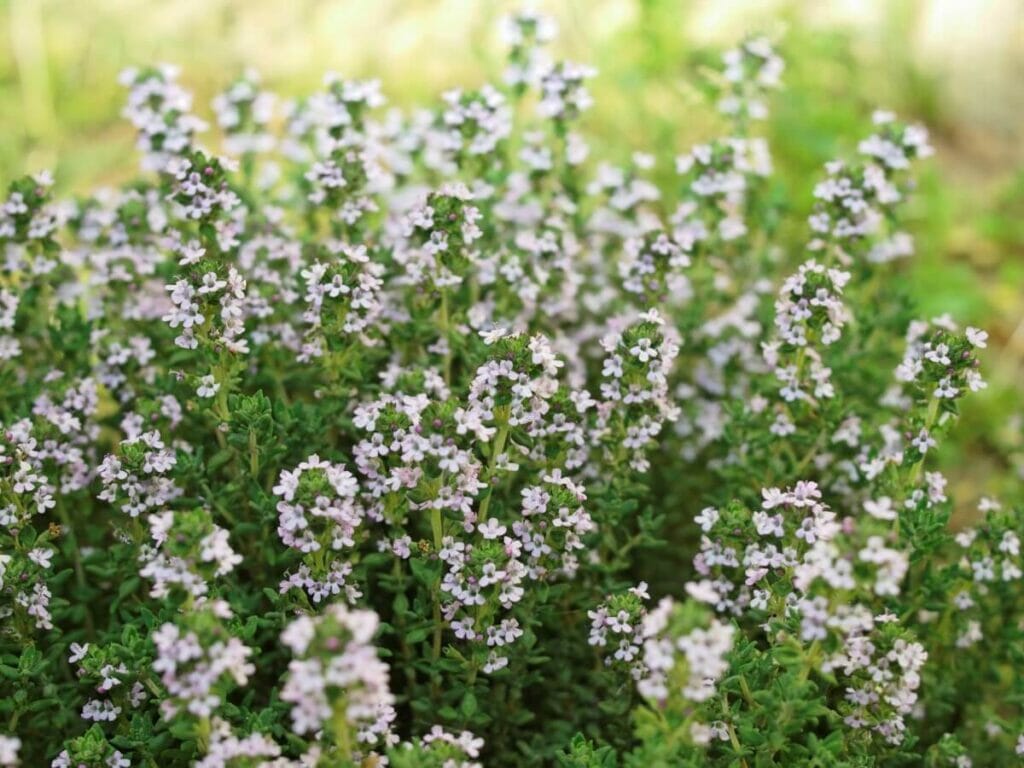
Thyme is another popular garden or kitchen herb that doubles as a companion plant for carnations. Its aromatic foliage and tiny purple, white, or yellow flowers help attract pollinators like bees and butterflies. Due to its strong scent, Thyme also helps deter pests such as aphids and caterpillars.
Thyme is an evergreen herbaceous perennial from the mint or sage family. These aromatic herbs grow best in Zones 5 to 9, which overlaps with the preferred Zones 7 to 10 of carnations. Like carnations, thyme also requires plenty of full sun.
23) Yarrow

Yarrow is an upright herbaceous perennial from the Achillea genus of the daisy family. These adaptable plants thrive in the Northern Hemisphere, especially in Zones 3 to 9. Yarrow plants have deeply-divided fern-like leaves and produce dense terminal umbels of tiny white or yellow flowers.
Yarrow is an excellent companion plant for carnations because it attracts beneficial predatory insects like hoverflies or lacewings. To these insects, the umbels of yarrow plants look like landing pads. Hoverflies and lacewings both eat aphids and other annoying pests.
24) Zinnias

Zinnias are bright, colorful flowers from the daisy family native to South America. Zinnia flowers are great companion plants for carnations because they lure in vital pollinators like bees and hoverflies. These annuals also attract ladybirds and other insects that consume common carnation pests like aphids.
Zinnias have large, daisy-like flowers that can be single or semi-double. Depending on the species, zinnias have lance-shaped or oval-shaped leaves, and upright flower stems. Zinnias are compact, allowing them to complement your carnations well in a summer display.
Carnations Companion Plants FAQs:
How Do You Make Carnations Look Their Best?
To make carnation flowers look good, water them once a week as more moisture helps produce healthy flowers. You can also use attractive companion plants like chrysanthemums to complement and emphasize your carnations.
Do Carnation Plants Spread?
Carnations are herbaceous perennials that can gradually spread. As such, it’s essential to give carnations approximately 6 to 12 inches of space when planting them.
What Compost is Best for Carnations?
Carnations grow well in most types of compost but prefer garden compost. These beautiful perennials are heavy feeders that need lots of nutrients, so give them plenty of organic matter.
What are Companion Plants for Carnations?
Companion plants for carnations can include other flowering plants such as geraniums, pansies, roses, and snapdragons. Herbaceous plants like sage, lavender, and rosemary can also work well. These companions can help deter pests, provide shade, or just enhance the aesthetic appeal of your garden.
Why are Companion Plants Important for Carnations?
Companion plants can offer various benefits to carnations. They can deter pests, help improve the soil, provide shade, or attract beneficial insects. Certain plants can also help enhance the overall aesthetic of your garden when paired with carnations.
What are the Best Plants to Deter Pests from Carnations?
Marigolds are an excellent choice to deter pests from carnations. They are known to repel nematodes and other garden pests. Additionally, herbs such as sage and rosemary can help keep some insects at bay.
Can I Plant Carnations Next to Vegetables or Herbs?
Carnations can be planted next to certain vegetables and herbs. However, it’s important to consider each plant’s specific needs. For example, carnations prefer well-drained soil and full sun, so they would do well with herbs and vegetables that have similar requirements.
Can Companion Planting Help Improve the Soil for Carnations?
Yes, companion planting can help improve the soil for carnations. Some plants can help enhance soil quality by adding organic matter or fixing nitrogen. However, carnations do not require nitrogen-rich soil, so avoid companions that overly enrich the soil with nitrogen.
Are there any Plants that I Should Avoid Planting Near Carnations?
Generally, I avoid planting carnations near plants that require heavy watering or those that prefer more acidic or alkaline soils than carnations. Also, steer clear from plants that tend to be invasive and could overshadow or compete with the carnations.
Wrapping Up
As we can see, there are plenty of companion plants that are great for growing alongside carnations. Some of the best companion plants for carnations include borage, chrysanthemums, and nasturtiums. Use these companion plants to attract pollinators, deter pests, or simply complement the colorful, fragrant flowers of your beloved carnations.
For more, see our in-depth guide to the fastest growing dianthus flowers, whether carnation flowers are edible, and whether carnations are toxic to cats, dogs, and other pets.
Spread the love